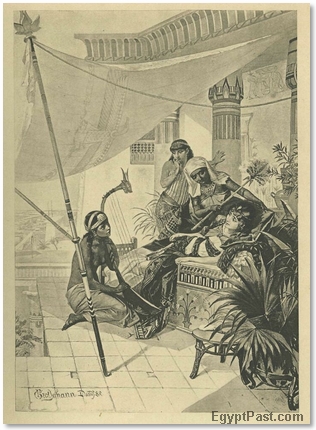Egypt and its Neighbours

Egytian Statue of a Woman With Ceremonial Head Dress
Foreign Relations of Egypt.—During a very long period of history the Egyptians were isolated. The deserts that surrounded the fertile Nile valley provided a natural barrier against invasion. As a result Egyptian civilization was left to develop undisturbed for many centuries. But while this meant that Egypt was spared the ravages of foreign invasion until much later in its history, its isolation also meant that it did not benefit from the interchange of ideas brought about by contact with other civilizations. The Egyptians could take pride in the fact that much of its technology and science had been developed at home, and not borrowed, even when similar advances in the arts and sciences had been made independently elsewhere. But Egyptian isolation, coupled with a tendency to copy past precedents rather than innovate meant that other younger civilizations eventurally surpassed Egypt.
Barter with the south was practiced from time immemorial, and a trade in oils and woods was carried on with traveling merchants from the north and east, but both were consummated on Egyptian soil until a comparatively late period.
The twelfth dynasty saw extended relations toward the south, and the pursuit of the Hyksos at the beginning of the eighteenth opened new connections with the north.

Foreign Influences on Egyptian Culture
The notable expedition under Queen Hatasu (p. v.) to Punt (see SOMALI COAST) for incense and other desirable objects was a public venture.
In the new kingdom trade was carried on privately in the east, but the Government also had its own ships which visited the coast countries. Multitudes of things were imported, and many retained their foreign names, probably a mutual operation. Strange to say, the eastern wars gave this impulse to trade, and their records have revealed much of the geography of the times. Of the lands traversed Palestine included the "Upper" and "Lower" Retenu, or "Canaan," and the land of the Amorites; Phoenicia was Keft, and its inhabitants Fenech; Syria was Naharan, and extended to the Euphrates, which is described as that "reversed water, on which one journeys northward upstream."
Assyria was probably not visited by egyptian merchants or travellers to any extent, and Babylonia was a terra incognita. Hundreds of Syrian places are mentioned whose sites are unknown. In Palestine there were many tribes, each with its strong place, but Syria alone offered the resistance of powerful national might. To some extent the Egyptians had knowledge of the peoples of Asia Minor, and of the islands, especially Cyprus. (See W. Max Muller, Asien and Europa, Leipzig, 1893.) After the eighteenth dynasty there was a heavy Semitic immigration into the Delta, and the mixing of races was much promoted by the multitudes of slaves taken in war. The same effects came from the employment of Libyan and finally of Greek mercenaries in the later periods, only with results more fatal to the integrity of the state.
pyramids Egypt Mummies Search Engines Link Report
Egyptian Cities | Egyptian Education | Ancient Egypt | egyptian clothing | Egyptian Houses | The Egyptians | Egyptian Family Life | Egypt and its Neighbours | Government in Ancient Egypt | Egyptian History | Military | Organization of Ancient Egypt | Recreation | Egyptian Religion | Pyramids | About | Privacy Policy | Site News | Site Map
EgyptPast.com - Facts and Information About the History of Ancient Egypt
-